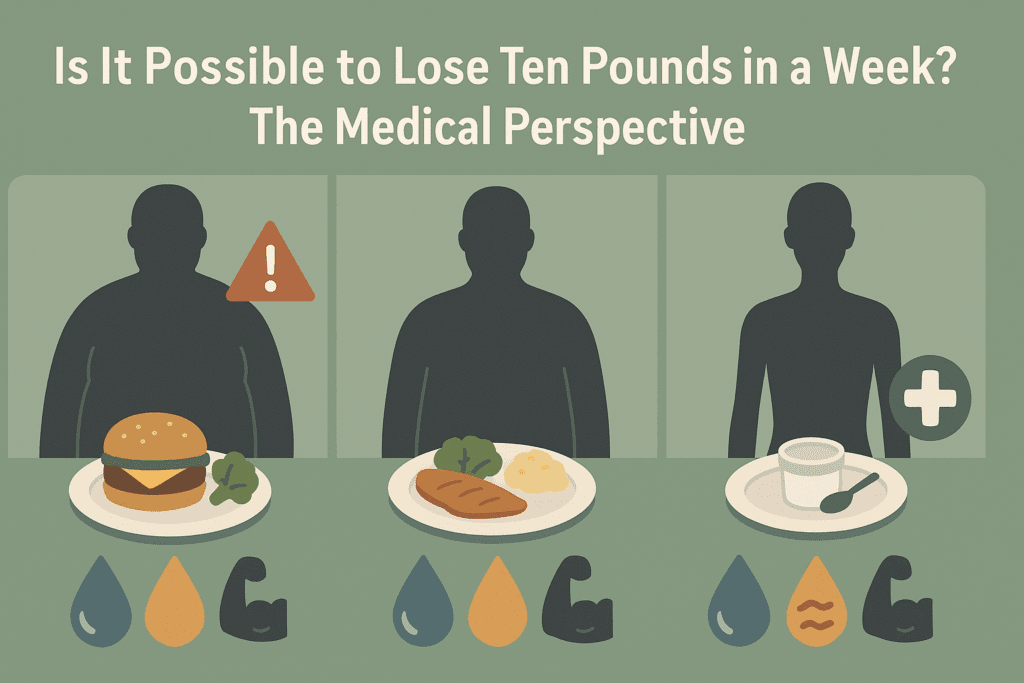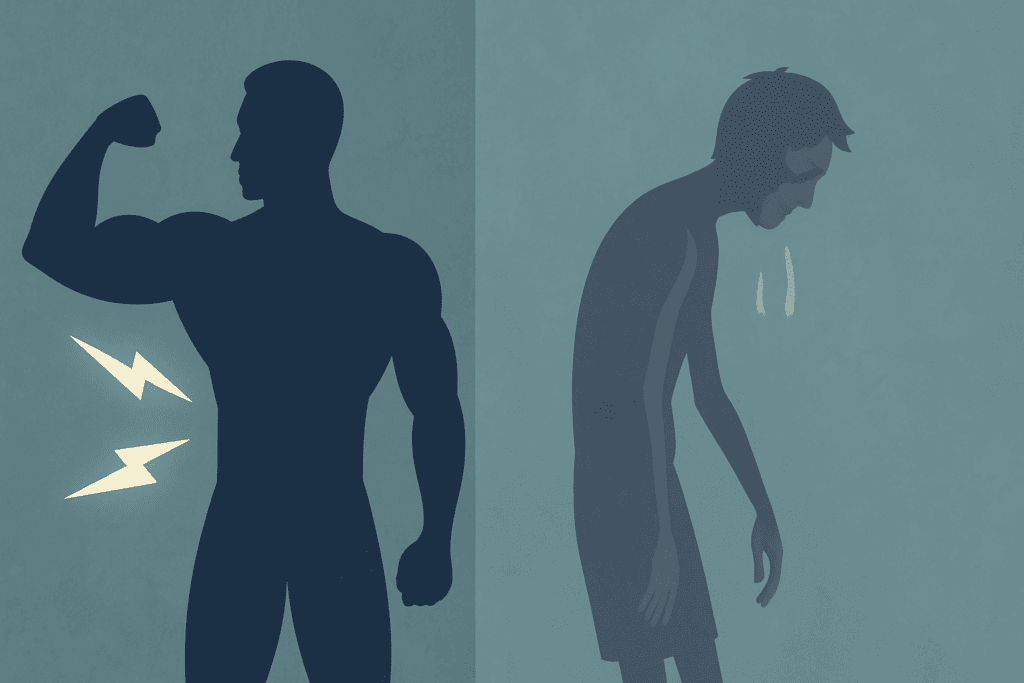Understanding the Promise: Is It Really Possible to Lose 10 Pounds in a Week?
The idea of rapid weight loss has long captivated the public imagination, especially when goals such as “how to lose 10 pounds in a week” or “how to lose ten pounds in a week” dominate search engines and wellness conversations alike. In a world inundated with crash diets, celebrity fitness fads, and social media transformations, losing a significant amount of weight in a very short span—often just seven days—sounds both appealing and urgent. But beneath the surface of these headlines lies a complex blend of physiology, science, and psychological motivation that deserves a deeper, evidence-based examination.
You may also like: Expert-Backed Weight Loss Tips for a Healthier Lifestyle: What You Need to Know for Long-Term Weight Control and Wellness
From a purely physiological standpoint, losing 10 pounds of pure fat in one week is extremely difficult, if not impossible, without extreme caloric deprivation or dehydration. To burn off 10 pounds of fat, the body would need to create a deficit of approximately 35,000 calories—an amount that far exceeds safe dietary restriction. That said, certain strategies, including very low-calorie diets, the three day diet, and even the armed forces diet, can lead to a short-term drop in total body weight through a combination of fat loss, water loss, and glycogen depletion.
The question then becomes not only “is it possible to lose 10 pounds in a week” but rather “what are the health implications of doing so?” In this article, we’ll take a comprehensive look at fast fat loss strategies, explore popular plans like the soldier diet 3 days regimen, and evaluate what real science—and medical experts—have to say about rapid weight loss outcomes. More importantly, we’ll discuss sustainable alternatives such as how to lose 10 pounds in two weeks or even how to lose 10 pounds in 3 weeks, which often produce better long-term health results while minimizing risk.

The Appeal of Rapid Results: Why So Many Seek to Lose 10 Pounds in One Week
There is no denying the psychological power of fast results. For many people, especially those struggling with motivation or self-image, the promise of learning how to lose 10 pounds fast is emotionally compelling. Whether preparing for an event, recovering from holiday indulgence, or simply hoping to kick-start a lifestyle change, the goal of dropping weight rapidly is often tied to immediate external motivations.
However, much of this rapid weight loss is not actually fat loss. Initial weight drops often reflect water loss due to decreased glycogen storage and reduced carbohydrate intake. When someone embarks on a plan like the 3 day diet or the detox lose 10 pounds in 3 days trend, the body expels glycogen and associated water, leading to quick results on the scale that may not reflect meaningful or lasting fat reduction.
This distinction matters because fat loss—not just weight loss—is what ultimately reduces health risks associated with obesity. The obsession with the scale can lead to yo-yo dieting behaviors that disrupt metabolism, impair mood, and make it even harder to achieve long-term weight loss success. That’s why even those who wonder how to lose 10 lbs fast must pair that interest with an understanding of what weight is actually being lost.

The 3 Day Diet: What It Is, How It Works, and What the Science Says
One of the most frequently searched strategies for quick weight loss is the three day diet, sometimes referred to as the 3 day diet menu lose 10 pounds. This plan has been around for decades and typically includes a strict, low-calorie food list spread across breakfast, lunch, and dinner over a three-day period. Common menu items include tuna, eggs, bananas, and black coffee—all selected for their low caloric value and satiety.
Supporters of the 3 day diet claim that it can help people lose 10 pounds in one week, especially when followed by four days of moderate eating, creating a weekly cycle. While some individuals have reported that they “lost 10 pounds in one week” or at least saw a sharp drop in weight after following the 3 day diet lose 10 lbs menu, experts caution against misinterpreting the results. The majority of the lost weight is typically water and lean muscle tissue—not fat.
Furthermore, this type of diet is severely restricted in essential nutrients, including fiber, calcium, and healthy fats. For this reason, many physicians and registered dietitians warn against following such extreme plans for more than a few days. While short-term plans like the 3 day diet can provide a sense of control or a motivational jumpstart, they should never replace a balanced approach to sustainable nutrition.

Inside the Armed Forces Diet: Origins, Structure, and Effectiveness
The armed forces diet—sometimes called the military diet or army diet plan—is another popular plan that promises rapid results. Like the three day diet, the soldier diet 3 days regimen is a low-calorie eating program that claims participants can lose 10 pounds in a week by following a detailed meal structure. Though the origins of this diet are not officially tied to any branch of the military, its name evokes discipline and toughness—qualities often associated with rapid physical transformation.
Typical meals on the army diet plan include hot dogs, saltine crackers, and small servings of meat and vegetables. While it does provide some variety across its three-day cycle, the total caloric intake often hovers around 1,000 to 1,200 calories per day. This deficit can lead to short-term weight loss, though, again, much of that reduction may be water weight or glycogen-related.
Health experts consistently note that this form of calorie restriction is not sustainable. While it may help someone lose 10 pounds in 2 weeks or even lose 10 lbs in two weeks with repeated cycles, the long-term metabolic effects and nutritional inadequacy make it an impractical solution for most people. Additionally, such plans often fail to account for individual differences in body size, age, activity level, or underlying medical conditions.

Is It Possible to Lose Ten Pounds in a Week? The Medical Perspective
So, is it possible to lose ten pounds in a week? The answer depends entirely on the method used and the composition of the weight lost. According to the Mayo Clinic and other reputable health institutions, a safe and sustainable rate of weight loss is between one and two pounds per week. Losing 10 pounds in one week through fat loss alone would require an extreme caloric deficit that is neither practical nor advisable for most people.
Medical professionals emphasize that rapid weight loss methods often result in decreased lean muscle mass, slower metabolism, and rebound weight gain. For example, someone who adopts the detox lose 10 pounds in 3 days plan may see short-term results, but these can backfire once normal eating resumes. Moreover, aggressive dieting may also trigger fatigue, nutrient deficiencies, and psychological stress, undermining the very health outcomes the person hopes to achieve.
That said, certain clinical interventions under professional supervision, such as medically supervised very-low-calorie diets (VLCDs), have been used to achieve rapid weight loss in obese individuals. These protocols include frequent health monitoring and supplementation to prevent complications. Even in these cases, however, losing 10 pounds in a week is considered an outlier, not a standard.

What Happens When You Try to Lose 10 Pounds Fast?
The body’s response to rapid weight loss is complex. When a person drastically cuts calories in an attempt to figure out how to lose 10 lbs in a week, the body enters a state of metabolic adaptation. This often means a reduction in resting metabolic rate, making it harder to continue losing weight in subsequent weeks. Hormones such as leptin and ghrelin, which regulate hunger and fullness, can also become dysregulated.
There’s also the issue of muscle preservation. Without adequate protein and resistance exercise, a significant portion of the weight lost may be lean body mass. This compromises strength and function, and it makes future fat loss more difficult. For those attempting to lose 10lbs in 3 weeks, incorporating high-protein meals and resistance training can help prevent this muscle loss.
Digestive changes may also occur. Crash diets and quick detoxes may disrupt gut microbiota, slow bowel movements, or cause bloating due to fiber deficiency. For those wondering how to lose 10 in two weeks or how to lose 10 in 3 weeks, choosing a plan that emphasizes balanced meals and gradual reduction in calories can help maintain gut health and long-term weight regulation.

How I Lost 10 Pounds in 3 Weeks: A Realistic Alternative
For those questioning whether extreme methods are the only path, success stories from people who learned how to lose 10 pounds in 3 weeks often share a different narrative. These approaches prioritize consistency, meal timing, hydration, and exercise rather than deprivation. They highlight how a modest daily deficit of 500 to 750 calories, combined with 30 to 60 minutes of physical activity, can produce steady and sustainable results.
Rather than focusing solely on how to lose 10 pounds fast, this method emphasizes how to lose ten pounds in two weeks or three weeks while still nourishing the body. A focus on whole foods, high-quality proteins, fiber-rich vegetables, and unprocessed carbohydrates forms the foundation of these success stories. People often report not just weight loss, but better energy levels, clearer skin, and improved mood—benefits that crash diets rarely offer.
Those interested in achieving results like this may find greater success with evidence-based strategies such as intermittent fasting, moderate carb cycling, and structured workout plans. The key lies in building habits that are repeatable and enjoyable, rather than punishing or restrictive.
Detox Diets and Rapid Weight Loss: Myth vs. Reality
Detox diets are frequently marketed as a solution for those trying to lose 10 pounds in 10 days or follow a plan to detox lose 10 pounds in 3 days. These programs often rely on juice fasts, laxatives, diuretics, or very low-calorie foods. While these diets may lead to rapid water weight loss, they typically do not eliminate “toxins,” as the body already has organs—like the liver and kidneys—designed for detoxification.
In fact, rapid detox programs can cause electrolyte imbalances, dehydration, and digestive distress. The body may rebound with intense hunger, increased fat storage, or slowed metabolism. For people wondering what is the army or combat diet, it’s worth noting that such restrictive plans often mirror the structure of a detox but lack long-term sustainability.
A better approach might be to combine gentle detox principles—such as increased fluid intake, reduced processed food consumption, and more fruits and vegetables—with an overall calorie-controlled eating plan. This allows for mild detoxification benefits while supporting fat loss and preserving health.

Sustainable Alternatives: How to Lose 10 Pounds in Two Weeks or More
While the dream of how to lose 10 pounds in a week will continue to appeal, the reality is that most people will see better and safer outcomes when pursuing gradual weight loss. Learning how to lose 10 pounds in two weeks, or even lose 10 lbs in three weeks, gives the body time to adjust, metabolically and hormonally, and helps preserve lean mass while shedding fat.
This can be achieved through a structured, realistic plan. Start with a moderate caloric deficit of 500 to 750 calories per day, prioritize protein at every meal, avoid refined sugars, and engage in consistent movement—including both cardio and resistance training. These behaviors form the foundation of most long-term success stories, and they are far more sustainable than a 3 day diet menu designed to shock the system.
Consistency is also key. People often ask how to lose 10 lbs in 2 weeks but forget that sticking to a plan—even a simple one—is more important than perfection. Results may come slower than crash diets, but they are far more likely to last, with fewer negative health consequences.
Frequently Asked Questions: Expert Insights on Rapid Weight Loss and Popular Diet Plans
1. Can exercise alone help you lose 10 pounds in a week without changing your diet?
While exercise plays a critical role in healthy weight loss, relying on physical activity alone to lose 10 pounds in a week is unrealistic and physiologically unsustainable for most individuals. To lose 10 pounds in one week strictly through exercise, a person would need to burn approximately 35,000 calories—a feat requiring marathon-level daily exertion without rest. Even elite athletes would struggle to meet this threshold without risking severe injury, dehydration, or overtraining syndrome. Instead, experts recommend integrating exercise with targeted dietary strategies when exploring how to lose 10 pounds in a week or how to lose ten pounds in a week safely. Structured workouts can support fat metabolism, but caloric control and macronutrient balance remain essential for meaningful, short-term results.
2. What psychological effects might occur after following extreme diets like the 3 day diet or soldier diet 3 days?
Many individuals report short-term euphoria after rapid weight loss, particularly when initial results align with expectations set by plans like the 3 day diet or the soldier diet 3 days routine. However, this is often followed by emotional volatility, food fixation, and even rebound binge-eating once restrictions are lifted. These patterns are commonly associated with the “abstinence violation effect,” where dieters feel a loss of control after breaking strict food rules. Over time, repeatedly attempting fast-fat-loss methods like the armed forces diet or similar restrictive plans can impair self-esteem and body image. For those exploring how to lose 10 pounds fast, mental health support and mindful eating strategies may be just as important as physical tactics.
3. What role does sleep play in efforts to lose 10 pounds in 2 weeks or more?
Sleep is often overlooked in discussions about how to lose 10 pounds in two weeks, yet it significantly influences hormonal regulation and metabolic rate. Inadequate sleep disrupts ghrelin and leptin balance—hormones that regulate hunger and satiety—often leading to increased appetite and poor food choices. Additionally, sleep deprivation raises cortisol levels, which may hinder fat loss and contribute to abdominal weight retention. People aiming to lose 10 pounds in 3 weeks or adopt a sustainable plan beyond the 3 day diet menu often benefit from improving sleep hygiene. Establishing a consistent bedtime routine and minimizing blue light exposure can support metabolic health and improve outcomes during structured weight loss phases.
4. Are there safer alternatives to the detox lose 10 pounds in 3 days trend?
While detox diets often promise dramatic results—such as claims to detox lose 10 pounds in 3 days—many of these methods rely heavily on diuretics, laxatives, or unsustainable fluid-only regimens. Safer alternatives include nutrient-dense meal plans with mild calorie restriction, liver-supportive whole foods (such as leafy greens and cruciferous vegetables), and increased hydration with electrolyte balance. A gentle 10-day cleanse that emphasizes anti-inflammatory ingredients can deliver modest fat loss while protecting gut integrity. Those interested in how to lose 10 pounds in 10 days or longer might consider a plant-forward, high-fiber eating plan that supports detoxification naturally through liver and kidney function—without the harsh side effects of extreme cleanses.
5. Why do some people lose weight faster on the army diet plan than others?
The variability in results from the army diet plan, or other structured programs like the three day diet, is largely influenced by individual differences in basal metabolic rate (BMR), insulin sensitivity, stress levels, and previous dieting history. Someone with higher muscle mass may experience more dramatic changes than someone with a sedentary lifestyle or a slower metabolism. Hormonal fluctuations—especially in women—can also affect weight loss responses. Additionally, water retention, sodium sensitivity, and gastrointestinal transit times vary significantly across individuals, making weight loss results from plans like the 3 day diet lose 10 lbs menu difficult to predict uniformly. Those aiming to lose 10 lbs in two weeks should personalize their approach rather than rely solely on templated regimens.
6. What are the long-term consequences of repeatedly trying to lose 10 pounds in one week?
Chronically engaging in extreme weight loss cycles—particularly in efforts to lose 10 pounds in one week—can lead to metabolic adaptation, commonly known as “starvation mode.” This condition slows the body’s energy expenditure in response to prolonged caloric deprivation. Over time, it becomes harder to maintain weight loss, and regaining weight often comes more rapidly and with greater fat accumulation. There are also potential consequences for thyroid function, reproductive hormones, and mood regulation. For those repeatedly attempting how to lose 10 lbs in a week or how to lose 10 pounds in a week, incorporating metabolic recovery periods and adopting a long-term approach like how to lose 10 pounds in three weeks may improve both health and sustainability.
7. How does hydration influence the outcomes of fast weight loss plans like the three day diet?
Hydration plays a pivotal role in rapid weight fluctuations, especially when using short-term plans such as the three day diet or the armed forces diet. Many people report quick weight drops not because of fat loss, but due to glycogen depletion and associated water loss. However, dehydration can lead to lightheadedness, constipation, and impaired performance during physical activity. Increasing water intake—especially with mineral-rich fluids—can mitigate these symptoms and enhance fat oxidation. Those exploring how to lose 10 lbs fast or how to lose 10 pounds in 10 days should focus on proper hydration not just for health, but also to avoid misinterpreting water loss as sustainable fat reduction.
8. Can someone lose 10 pounds through intermittent fasting instead of strict calorie counting?
Yes, intermittent fasting (IF) can be a viable strategy for individuals interested in how to lose 10 pounds in 3 weeks or even how to lose 10 pounds fast, especially when paired with mindful eating during feeding windows. IF regimens such as 16:8 or alternate-day fasting help some people naturally reduce caloric intake without the need to track every bite. Research also suggests that fasting can improve insulin sensitivity and promote cellular repair through autophagy. However, those with a history of disordered eating should approach fasting with caution, and medical guidance is advised. For individuals wondering how to lose ten pounds in two weeks using IF, combining it with balanced, high-protein meals may provide optimal results without extreme dietary restriction.
9. What are the social implications of crash dieting, especially with public pressure to lose 10 pounds fast?
Crash dieting often comes with social reinforcement—from online “before-and-after” posts to peer validation of thinness—which can create a cycle of unrealistic expectations. This is particularly relevant for those researching how to lose 10 pounds in a week or attempting plans like the 3 day diet menu lose 10 pounds under external pressure. Social media’s portrayal of rapid transformations can distort perceptions of health, leading individuals to prioritize short-term aesthetics over long-term wellness. In professional settings, the desire to quickly “look the part” for an event or presentation may encourage unsustainable strategies like the army or combat diet. Greater awareness and dialogue around body diversity, metabolic individuality, and psychological well-being are essential for shifting the narrative from weight loss at any cost to holistic health outcomes.
10. Are there technological tools that can support people trying to lose 10 lbs in three weeks or more?
Yes, digital health tools are evolving rapidly and can support those interested in how to lose 10 in 3 weeks or how to lose 10 pounds in two weeks with greater precision and accountability. Apps that track macronutrients, wearable devices that monitor heart rate variability, and continuous glucose monitors (CGMs) for real-time feedback can all enhance self-awareness and decision-making. Emerging AI-based coaching platforms now offer personalized meal plans and adaptive workout regimens based on biometric data. These technologies can also provide behavioral nudges, habit tracking, and community support—all of which contribute to long-term adherence. For those disillusioned by fad diets like the soldier diet 3 days or 3 day diet menu approaches, smart tools offer a more adaptive and data-driven alternative for sustainable fat loss.
Final Thoughts: Is It Possible to Lose Ten Pounds in a Week Safely?
The honest answer to the question “is it possible to lose 10 pounds in a week?” is yes—but with important caveats. Much of the loss is likely to be water weight or lean mass, not fat, and such approaches often carry health risks when not medically supervised. Diets like the armed forces diet or the three day diet may produce short-term scale victories, but they rarely lead to long-lasting health improvements or sustainable weight maintenance.
Rather than chasing extreme outcomes like how to lose 10 pounds in 10 days, experts advise focusing on realistic, evidence-based strategies such as how to lose 10 pounds in two weeks or how to lose 10 pounds in 3 weeks. These approaches support metabolic health, mental well-being, and long-term weight control without the danger of rebound weight gain or nutritional deficiencies.
Ultimately, the best approach to weight loss is one rooted in consistency, balance, and science—not shortcuts or starvation. When considering any diet or rapid fat loss plan, it’s crucial to consult with a qualified healthcare provider or registered dietitian to ensure safety, appropriateness, and sustainability. The number on the scale may change quickly, but true health takes time—and it’s well worth the investment.
Was this article helpful? Don’t let it stop with you. Share it right now with someone who needs to see it—whether it’s a friend, a colleague, or your whole network. And if staying ahead on this topic matters to you, subscribe to this publication for the most up-to-date information. You’ll get the latest insights delivered straight to you—no searching, no missing out.
Further Reading:
The Military Diet Claims You Can Lose up to 10 Pounds in 1 Week


